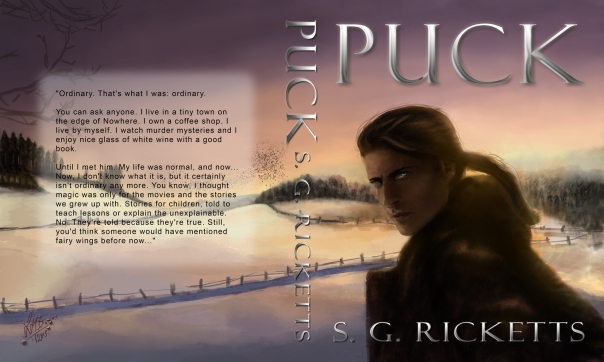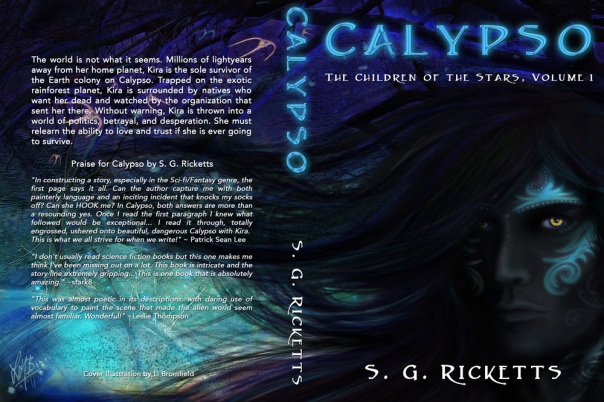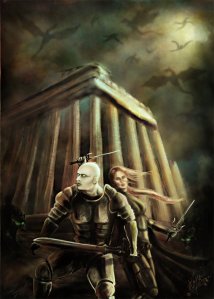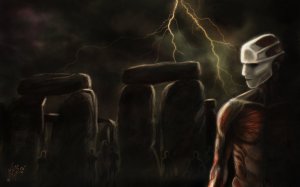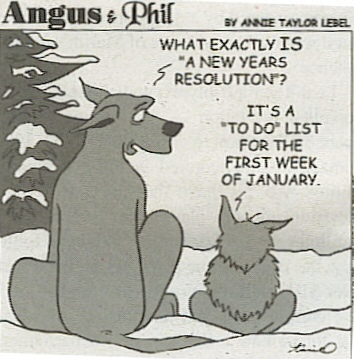Blog Archives
Ta-Da!
I’ve been gone for so long, and I’m probably going to vanish again for another week or two as life wraps up. Oy, that life… Keeps getting the best of me. I have a few updates to post really quickly, though, as well as some shameless promoting of a fabulous artist.
First, Calypso is nearing the halfway point! YAY! I know, I know, it’s dragging by. Trust me, I want it out there just as much as y’all do. I’m beginning to understand why it takes some books years to appear. There are so many details and subplots and character flaws to fix! For those of you out there that are authors, tackle massive projects with care… I’m beginning to wonder just what I’ve gotten myself into. As it stands, chapters 1 – 9 are fully edited (first round edits), so chapters 10 – 18 remain. Luckily, the second half is more concise and coherent, so it should be quicker. Now, just to stay within my 80K to 120K word limit for Sci-Fi… Can I pull a J. R. R. Tolkien or Diana Gabaldon please and have it be 150K? Please?
Second, Puck is on hold indefinitely. I am so incredibly disappointed in myself for this, but I’ve had to face the reality that I’m tackling too many projects at once. I hope to get a few chapters up in the coming weeks, but don’t hold your breath. School lets out, and I’ll be immediately jumping into “homeschooling” my son (if you count Pre-K as school, which I do) and preparing for the arrival of the fourth member of our little clan.
Third, the lovely Li Bromfield has completed the new cover for Puck! For those of you new to S. G. Ricketts, she is the same artist who did my cover for Calypso. She has an amazing talent for drawing the scene right out of a writer’s mind, literally and figuratively. Here are my two covers done by her:
She’s on deviantart.com under the-Li and does a myriad of different things. She does commissions for indie authors, gamers, and those who love awesome art. Here are a few of my personal favorites, but remember: you can always look through yourself. Who knows? Maybe your idea or book will be her next masterpiece.
My Anti-Resolutions
2012 has arrived and with it comes so many expectations and hopes. This year, I hope to have so many things done. Call me weird. Call me superstitious. I refuse to make any resolutions about those hopes.
Resolutions to me scream of half-hearted attempts. “My resolution is to work out more.” Two days in and most people give up. “My resolution is to get a better control on my anger.” The next time someone ticks you off, you’ll forget that resolution. They seem to be shallow attempts by us to say, “I know what my flaws are and I’ll try to accomplish them, if I can.” What kind of resolution is that, really?
Webster’s defines a resolution as “the act of resolving or determining upon an action or course of action, method, procedure, etc.” How often, when we make our New Year’s resolutions do we determine a plan of action? How often do we figure out the steps needed to achieve our goal? I know I’ve never scheduled in a work-out time or fit “gym membership” into the monthly budget. New Year’s resolutions seem like just another waste of breath, another commitment we never intend to keep.
I’ll tell you what my goal for 2012 is, though. I plan on finishing Calypso, complete with editing and formatting. I plan on having an agent by December 2012. I plan on not counting on the end of the world. I plan on having The Real Cinderella completely written and partially edited. I plan on completing another year in school. I plan on building up my editing portfolio. And I have a timeline written out for all of those. Superstitious as I am, I refuse to make any of these my resolution. I will make them my goals, though. They shall be scattered on the walls throughout my house to remind me of what I’ve decided to do. There will be a big calendar with each deadline circled in red. And there will be updates on here and on Facebook to keep me accountable. 2012 shall be a productive year, if nothing else.
What about you? What are your goals for 2012 and what have you done to make sure you achieve them? Are you really sold out to these plans, or are you like most people, content to say words you never intend to fulfill? What about you?
8 Qualities of A Great Book
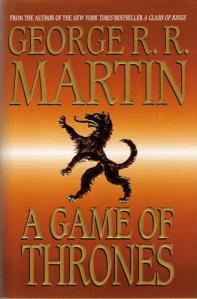 I like rules. I like knowing exactly what I need to do in order to accomplish something. It’s why I love to cook. There are a set number of steps that lead to an end result. While life doesn’t always turn out as well as my lemon pepper chicken, I’ve found that there are a few “recipes” that hold true. One of those is the recipe for writing a great book. It applies to short stories, novellas, novels, epics, poems, you name it. And, with the editing I’ve done and the writing I’ve attempted, I’ve found these things to be true across the board.
I like rules. I like knowing exactly what I need to do in order to accomplish something. It’s why I love to cook. There are a set number of steps that lead to an end result. While life doesn’t always turn out as well as my lemon pepper chicken, I’ve found that there are a few “recipes” that hold true. One of those is the recipe for writing a great book. It applies to short stories, novellas, novels, epics, poems, you name it. And, with the editing I’ve done and the writing I’ve attempted, I’ve found these things to be true across the board.
1. A polished work.
Basically, copyediting. In other words, no grammar errors, spelling issues, or tense changes within the story. The biggest pet peeve I have is reading a highly recommended author who has grammatical errors in their stories. (God forbid anyone should read my stories at this point with their grammatical pits and spelling sink-holes, but I’m aware of them.) If a book is not polished on the foundation of the piece, many will put it down.The grammar is the framework of your piece. It’s the bones, the flour of your writing. If you have crooked bones, your body will be messed up. If you have crummy flour, your cake will be messed up. If you have poor metaphors like this, your blog will be messed up. Alas, I digress. Grammar and its fellow compadres are the first of the most important steps to a great book. If I was to reading a book that read like this I woud get real frustrated and stop.
2. Clear Storyline.
I don’t know how many young authors I’ve sent back to the drawing board to reexamine their storylines. I personally start every story out with a rough sketch of what’s going to happen. The simplest form of this is the same diagram we all used in high school: intro, starting action, conflict, rising action, climax, conclusion. Because I am rather detail-oriented, I tend to go slightly more in depth. Several pages more in depth… But the point still stands. Without a storyline, the book becomes disjointed, haphazard, and unclear. You need to decide what Mary is going to do, what her end goal is, and how she’s going to get there before you start. (This prevents a lot of writer’s block as well.)
3. Gripping narration.
Have you ever read a book you thought would be great, but the narration was awful? The style the story is written in is a huge factor in the overall quality of the book. If it is a science-fiction book written with a very lax style, a reader might put it down. If it seems like the mood of the story is that of two girls gossiping, a reader might put it down. I was stunned one day when I suggested to a writer that they clean up their grammar, take out some of the slang, and make it a little more professional. Her response was, “Well, I wanted people to know that anyone could write. I didn’t want it to be perfect, because that’s not how most people write.” As a master craftsman of your trade, it isn’t your responsibility to sit at everyone else’s level. If I go to a Gordon Ramsey restaurant, I’m not expecting ramen noodles and Hamburger Helper. I’m expecting food I couldn’t made. It’s the same with your writing. People, when they open a book, expect to be whisked away into a different world where they can lose themselves in the story. If you have a lassiez faire manner of writing or a tendency to go into intense detail, they won’t be able to get into the story. Think about your favorite book or author and attempt to emulate them. For example, George R. R. Martin has a very refined manner of writing. He uses many crass phrases and has many vulgar characters, but his narration is flawless and almost formal. Leave the contemporary speech or the teenage tone to the dialogue and use the narration to keep the story flowing. (Side note: If your story’s style is contemporary or has a teenage tone, forget that last line. I’m speaking mainly to the people who have tons of “like,” cliches, and “OMG wow” moments.)
4. Vivid setting
If you’ve seen Avatar, you understand. If you’ve read the C. S. Lewis Narnia series or played World of Warcraft, you understand. As I said above, the reader wants to disappear into a different world. Make it believable. Really, this is one of the simplest (yet most complex…) of the 8 to do. Readers have a ready imagination and can usually push through even the simplest of descriptions. Take Hemingway for example. Still, as the writer you have to put in a fair bit of effort as well. If you’re writing a historical fiction, make sure your history is correct. Add minor details. If you’re writing a science-fiction, make sure your science is correct or that you have something to back it up with. Add minor details. If you’re writing fantasy, make sure to believe your own story. Get your religions correct (that you make up or use). Get your fictional histories straight. Add minor details. Setting is more about the small details than it is about how perfectly you describe the color of her eyes. On top of that, you have to believe it. If you have something unbelievable, write about it as if it’s every day fact. Harry Potter: magic exists and so do shriveled up old men that use other weirdos’ heads as their own. Insanity, but we bought every word of it.
5. Psychological depth
Most of you may be scratching your heads on this one, but think about it. Every book you’ve read has some moral or premise to it. Even children’s books have some psychological background. (Baby-baby books, maybe not.) Even if the premise is only to teach, that has a meaning. In the heavier, longer books (i.e. short stories, novellas, novels) the morals become more evident. Each successful book on the market has some psychological intuitiveness (George R. R. Martin), some good vs. evil moral (J. K. Rowling), or romantic element of true love (Stephanie Meyer). Take that and put it to use in your own story. Even if it is something incredibly minor, try to add psychological depth. Give your characters more than just a Good and Bad rating. Give the good guys some flaws. Give the bad guys a background. Make them relatable. Give the reader something to cheer for. Your readers will become so much more invested when they have a reason to read.
7. Hooks at the end of each chapter
I hate getting to the end of a chapter and thinking, “Ok, I guess I can stop here for the night.” I’m left feeling almost cheated. To go along with gripping narration, end each chapter as a cliffhanger. Pretend like each chapter is an episode in a series. Would you really end the episode with “She buttoned up her nightdress and went to sleep.” Probably not. Would you end a chapter with “She buttoned up her nightdress and went to sleep. He watched from the shadows, waiting.” Yes. Can you imagine if your favorite show ended with a mysterious someone watching your heroine? You’d be dying to watch the next show. Do the same thing with your book. Make them turn that page.
8. Use of literary tools
We learned about these in high school: alliteration, allusion, foreshadow, metaphor, simile… Use them. These are sprinkles on the top of a perfect sugar cookie of a book. They aren’t going to make or break the flavor of the cookie, but 9 times out of 10, people will choose the cookie with sprinkles. Use them sparingly. These can make the difference between a good reading and a great reading. To use foreshadow as an example, how satisfying of a feeling is it when you start guessing at a murder suspect and get it right at the end? You used the foreshadowed clues to determine who it was. You also probably kept flipping the pages to figure out who it was. Additionally, there is nothing quite like having a prophecy or a missed hint appear at the end of a book with a completely different outcome. Who would have guessed that (SPOILER ALERT) Jacob would end up with Renesmee? Foreshadow. ‘Nuff said.
So, now that you have the 8 qualities every great book needs, check out yours. Does it have these? Are there any books you’ve read and loved that don’t? Are there any books you’ve read and hated that don’t? And yes, my books are still severely lacking in many of these categories. Everything’s a work in progress, but at least I have the steps to get there!

